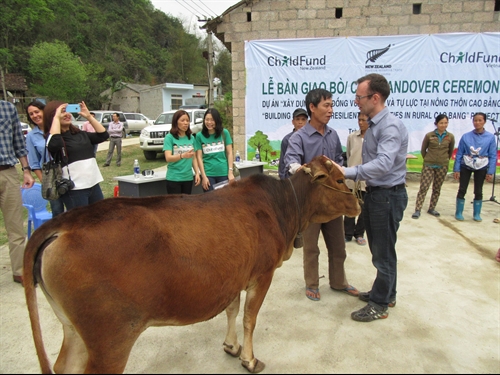 Features
Features

Life of inhabitants in mountainous northern province of Cao Bằng has been improved thanks to New Zealand -funded support programme
 |
| Pigging out: New Zealand’s ambassador and other representatives of the NZ embassy and Childfund visit a household rearing pigs. — VNS Photo Bạch Liên |
by Vương Bạch Liên
Viet Nam News -Life has been difficult for Hoàng Văn Dung’s family as they live in a small village, reachable only on foot, surrounded by karst mountains and far from the commune centre.
In their small wooden house in Lũng Nhùng Village, the Mông man and his wife have tried hard to do farming to raise their three children.
The village, located in Lưu Ngọc Commune, is one of the poorest regions of Trà Lĩnh District in the mountainous far-north Cao Bằng Province.
For many families in the commune, it’s not always easy to do farming as there is not much arable soil and they can hardly make enough for their families.
However, their life has been improving for the past few months after they began raising goats, a new income generation activity that suits the local conditions.
Borrowing VNĐ10 million ($US450) from ChildFund charity organisation’s village credit scheme, together with the money they got from selling a pig, Dung’s family bought six goats to raise in June last year.
| ||
They also got training to take good care of the goats.
The goats gave birth after nine months.
“It’s great that my family can invest in larger herds, and has income to cover the costs of our children’s food, education and healthcare,” Dung said.
Goat rearing is proving to be a sustainable activity that guarantees an income for his family and other households of the region, affirmed local authorities.
The credit scheme and the training is part of a New Zealand project to support remote communities in Cao Bằng Province.
The five-year initiative, entitled Building Strong and Resilient Communities in Rural Cao Bằng, Việt Nam,” commenced in 2014 and is jointly funded by the New Zealand Aid Programme and ChildFund New Zealand.
From 2014 to 2019, NZD2.28 million (US$1.52 million) will be invested in order to build strong and resilient communities in rural Cao Bằng.
The project involves 1,700 local families, most of them ethnic minorities, in Trà Lĩnh District to boost agricultural production and incomes, improve access to vocational training and credit, and better plan for natural disasters.
Trà Lĩnh District is characterised by high poverty rates, geographical isolation, lack of access to economic opportunities and limited arable land. The region is also susceptible to natural disasters. Being situated in the far north of Việt Nam, it is home to many ethnic minorities. Forty per cent of the households in the district are classified as poor. Their main income comes from the plantation of sugarcane, maize and rice and raising of pigs, which has low economic value.
Under the project, local people have been trained to improve their skills to cultivate rice and raise pigs and goats. The households get access to a microcredit and savings system to access small loans to diversify their incomes.
Out-of-school youth are further supported through improved access to vocational training for the first time. They can learn car repair and aluminium glass work at workshops.
Six communes of the district will each get practical natural disaster preparedness plans.
Moreover, the people get access to new livestock through the cow bank scheme.
The scheme helps poor families by covering the upfront cost of livestock, allowing the families to start a small herd for meat or milk production, and to eventually repay the investment with cattle offspring. The cow bank scheme has improved household income and food security for the local people.
Long Văn Lạng was happy when his family was presented a female cow by New Zealand Ambassador Haike Manning last week, along with three other families of Cao Chương Commune.
The cows cost VNĐ19.8 million ($908) each and he paid only 10 per cent of the value (VNĐ2 million). When his cow gives birth to a calf, Lạng will return the mother cow to the cow bank, which will then be lent out to another family in the commune.
“I am very glad because it is the first cow of the family. The cow will help us in our farming activities,” he said.
Like several families in the commune, his family is trying to survive on little more than a dollar a day. His two young daughters still attend nursery school.
“The cow is very important to my family. It will provide manure, fertiliser to increase crop yields, an income through agriculture work, and provide meat. This means that my family will have nourishing food all year round, and will not go hungry,” he said.
New Zealand’s Ambassador to Việt Nam Haike Manning travelled to Cao Bang Province last week to visit communities involved in the New Zealand-funded project.
“New Zealand and ChildFund have made some direct impact on the local people. Our support is very practical and my discussion with local authorities has highlighted this approach,” he said.
The visible impact on the local people is an increase in real income and improvement in agricultural practices.
“Our investment in Cao Bằng is an example of New Zealand’s commitment to support vulnerable communities across Việt Nam to strengthen their ability to decide their own future, and to live to their full potential,” he said.
The ambassador said the idea behind the project was to build capacity and the ability of the locals to forge a sustainable path on their own for themselves and their future as well.
Previously, from 2011 to 2014, a livelihoods project and water and sanitation project in Trà Lĩnh district and Quảng Uyên District of Cao Bằng Province, was also carried out by ChildFund Việt Nam and ChildFund New Zealand with funding from the New Zealand Ministry of Foreign Affairs and Trade. The project had many positive results, affirmed local authorities.
|
Up to now, more than 600 households improved their production skills and applied the new knowledge successfully, helping to increase the maize and rice productivity. Nearly 600 households were supported with new income generation activities through village credit, cow bank, goat and pig rearing models. Nearly 1,300 adolescents participated in reproduction healthcare communications to learn about good practice and protect themselves from risks. More than 3,300 children were provided with access to hygienic latrines and clean water, both at home and at school.
Moreover, several new irrigation canals, water supply systems and primary and secondary schools were built, which has contributed largely to improving the local inhabitants’ life.
Nguyễn Sáng, ChildFund Việt Nam’s provincial manager in Cao Bằng Province, said at the beginning, he and his team faced some difficulties in convincing the local inhabitants to take part in the project as many preferred to get a “fish” immediately rather than a “fishing rod”. Then the team succeeded in convincing the people to believe in long-term advantages, when they can forge a sustainable path on their own.
“Previously, some other organisations helped them by offering free cows, but did not pay attention to understanding what the local households will do with the cow and how they will take care of it. But here, we do things differently. We let them take responsibility, and take action towards their investment goals, for their own benefit,” he said.
“We believe in the saying ‘give a man a fish and you feed him for a day; teach a man to fish and you feed him for a lifetime’,” he said.
Many inhabitants are now thankful to the project as they are better equipped to improve their life.
“I will take good care of my cow as it brings hope to my family. When it has calves, we will have more assets. If we sell a calf, we can generate our family income,” Long Văn Lạng said.
“We are working hard and trying our best to make enough, so that we can send our children to school and help them get better education than I did. With education and knowledge, they can definitely have a better life,” he said. — VNS
 |
| Milking it: Ambassador Manning handing over four cows to families in Cao Chương as part of a cow bank scheme during his visit to Cao Bằng Province. — VNS Photo Bạch Liên |